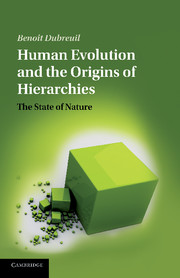Introduction
Published online by Cambridge University Press: 17 February 2011
Summary
for hundreds of thousands of years, our ancestors lived in relatively egalitarian foraging bands. Then, a few thousand years ago, they began to form increasingly larger-scale societies in which social hierarchies played a central role. Early chiefdoms, kingdoms, and city-states placed relationships of dependence and subordination at the center of social life. With the construction of the modern state and its expansion around the world, humanity has departed from social arrangements rooted in our deepest past, perhaps for good. What made this departure possible? Large-scale hierarchical societies are neither natural entities nor the outcome of our ancestors' deliberate planning. As philosopher Adam Ferguson (1819: 222) would have said, they are “the result of human action, but not the execution of any human design.” How can we explain their astonishing resilience and capacity to spread to new cultures?
Questions like these can be answered in different ways. One way of looking at the problem is from a functionalist viewpoint. What are hierarchies for? What is their use? This is certainly the approach favored by modern social contract theorists such as Hobbes, Locke, and Spinoza to account for the existence of the state. The state enables humans to overcome the situation of insecurity that pervades the state of nature. It facilitates collective action by bringing people under one rule. There is something true in this view, but pointing out the function of an institution does not properly explain its origin.
- Type
- Chapter
- Information
- Human Evolution and the Origins of HierarchiesThe State of Nature, pp. 1 - 8Publisher: Cambridge University PressPrint publication year: 2010



